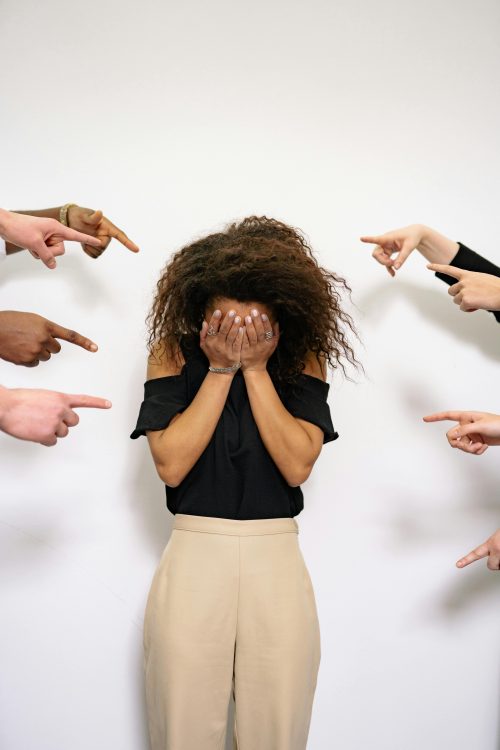As a mixed girl or woman, the widespread nature of mixed-race mental health issues probably doesn’t surprise you. You likely know what it feels like to struggle with your identity. You’ve likely felt torn between two or more different parts of yourself.
Maybe you’re confident in your identity. Even so, you might have experienced relationship conflict, or even verbal and emotional abuse because of it. No matter what your journey as a mixed woman has involved, I’m proud of you. It’s huge that you’re here and investing in your well-being.
I know what it’s like to feel like you have to neglect one side of you and accept the other. I also know what it’s like to be on the other side of that. I’m proud and confident in both parts of my heritage, but it took a lot of work to get here. I eventually realized I couldn’t walk through life wishing I was one or the other. As a women’s empowerment coach, I help mixed women improve their confidence and well-being. We do this by figuring out what you need to embrace who you are. I guide you to make life decisions that:
Support your values and goals.
Help you become the person you want to be.
If you or your daughter face mixed-race mental health challenges, I want you to know you’re not alone.
Research on Mixed-Race Mental Health
Mixed-race mental health issues are prevalent among adolescents and adults for various reasons. Let’s look at three domains in which mixed-race individuals experience discrimination and racism:
Home
School
Work
Experiences within these environments can heavily impact your identity and sense of self. One study found that mixed-race adolescents were at a higher risk for health and behavior issues than their single-race peers¹. This study did not determine the reasons for this higher risk. One possibility is stress related to identity confusion and conflict.
Identity issues that eventually lead to a higher risk of mental health disorders often begin early in life. Many mixed-race individuals feel out of place or not properly supported due to the treatment they receive at home, school, and within their community.
Contributing Factors of Mixed-Race Mental Health Problems
Being mixed is a beautiful thing, but there are times when you might feel like you have to choose a side.
Some words and behaviors have lasting and harmful consequences, such as being:
On the receiving end of racist jokes, nicknames, and comments.
Treated like you’re unworthy or not good enough.
Told that your mixed race status is undesirable.
Mixed-race mental health challenges can arise from repeated exposure to overt racism. They can also result from seemingly minor experiences like someone asking you why you braid your hair or what your “mother tongue” is.
Sometimes these comments and questions come from those closest to us. There’s nothing more difficult than struggling to fit in with the people who should protect you. Home should be where we should feel most comfortable and free to be who we are, but this isn’t always the case.
The Impact of Home Life on Mixed-Race Mental Health
Home is where we start to identify what makes us who we are as whole individuals. You ultimately have control over who you are and want to be, but many of your beliefs, values, and behaviors link back to your early life experiences. Words and actions that made you question your identity likely stick with you. The good news is, you can overcome them.
Both a lack of support and blatant mistreatment at home contribute to identity and mental health issues for mixed children and teenagers.
One study analyzed the interviews of fifty-five Black mixed-race adults². The focus was childhood and experiences with family members. These individuals had a wide range of experiences, but the ones that impacted a majority of the participants included:
Racist comments from family members
Mistreatment, especially from extended family
A lack of validation and support from parents or other family
Internalizing these experiences led to adverse outcomes for many of the participants, including:
Self-hatred
Body image issues
Identity struggles
Psychological distress
As a mixed woman, I can say I’ve experienced distress from being pulled in two different directions at home. Whenever I learned more about myself or leaned into one side more than the other side of my family, that decision was judged. I know many mixed women and individuals feel this way, which can lead to a lot of pent-up stress and negative feelings.
If this is your experience, remember to show yourself compassion and patience.
The Power of Words
Some mixed-race mental health challenges result from overt racism or discrimination. Other times, small comments or actions may have crept into your subconscious. Even seemingly harmless comments or questions can affect your view of yourself, your race(s), and your capabilities.
I recall being made fun of by family members. A relative of mine used to joke that my dad must have been the “milkman” because I had such a fair complexion when I was a young girl. What seemed like a joke affected my confidence and sense of belonging for years. Comments like this one only grew louder in my head and heart, especially because I didn’t know or meet my father until I was about twenty.
When you become proud and sure of your identity, comments like this can still hurt, but they don’t have as much power. Imagine how much power they have over mixed children who are still navigating their identities and finding their place in the world. Some children start to notice racial differences as early as three years old, according to one study³. A couple in this study observed their son trying to accurately depict his skin color while coloring.
Comments like “you should straighten your hair” influence us more than we realize as children. This implies that something is wrong with our natural hair, so we need to suppress that side of ourselves.
While experiences at home can do lasting damage to our sense of self and identity, experiences outside of home can also be detrimental.
Experiences at School That Contribute to Mixed-Race Mental Health Issues
Our identities are constantly in flux when we’re younger. Children observe and absorb so much from interactions with their peers. For many mixed girls, these interactions lead to self-doubt and confusion. I remember wearing pigtails, plaits, bows, and barretts, which all connected back to my “blackness”. However, my hair still looked different than the other black girls in my class. Because of this, I was often on the receiving end of rude comments.
Other little girls wanted to play with my hair because it was different. While it didn’t bother me at the time, I look at it quite differently these days. Children at school are subject to judgments about many characteristics such as:
Hair
Clothing
Accents
Demeanor
Being treated a certain way based on race can affect your view of your external appearance and internal being.
The interviews from the study above acknowledged how experiences at school can have this effect. One of the women recalls how she experienced racism in primary school. Other kids would ask her why she was brown. She had a white mother and a black father, but she still felt unsupported at home. Her mom’s approach was to:
Try to avoid talking about her mixed-race status
Tell her to embrace her mixed-race status (but she offered no further support or resources)
Two of the other interviewees were a brother and a sister with a white mom and a Black Kittitian father. They felt they couldn’t talk to their white mother about their experiences at school because they thought it might upset her. The woman, who was a girl at the time, wanted to talk to her mom. She felt bonded with her because of their shared gender. They worried that their mother would feel helpless and like she couldn’t protect them. So, they tried to protect her by not telling her about their experiences with discrimination at school.
These interviews reveal how good intentions can still contribute to mixed-race mental health issues.
Challenges at Work
In a work setting, people often find “their people” and connect with this group or individual because of similarities. However, this isn’t always possible if the workplace lacks diversity.
In the workplace, many mixed-race individuals face:
Isolation
Racism
Subtle discrimination
Being belittled or bullied
In a study of mixed-race women pursuing PhDs, one woman noticed that she was bullied and micromanaged when she interacted with both sides of her identity (white and Ghanian)⁴. This is something that other mixed women in mostly white workplaces have reportedly experienced.
When it comes to facing these experiences at home, school, or work, there is no perfect or ideal way to stand up for yourself, embrace your identity, or enjoy your journey. You have to learn what these events mean for you and acknowledge any pain that comes with them. When you can move beyond the lesson of the pain, you can stand against what plagues you internally.
How to Heal and Advocate for Yourself and Others
Many of us mixed women and girls are pressured to choose a side and completely ignore the other. I want to acknowledge how horrible and harmful this is. It’s like asking someone to eat the same meal every day for the rest of their lives. Is it possible? Yes. But is it an enjoyable, freeing lifestyle? No.
I am now, and have always been, judged by my appearance. Most of us are taught not to judge a book by its cover, but we’re not protected from the judgments of others. I’m intentional when these moments come up now. I use them to get curious and learn more about myself. This doesn’t mean I ignore my feelings or what is being said. Rather, it means that I focus on what works best for me at that moment. I lean into how I can extend this same grace to the person on the other side.
This reflection often leads me to the same conclusion – I am perfectly and wonderfully made.
This approach might not be enough for you right now if you’re struggling. No one has all of the answers, but with support from a compassionate and experienced coach, your outcomes can be shifted.
Becoming the person you want and need to be starts with a first step. You’ve faced some mental health concerns and emotional trials. What will be your next step to ensure you don’t become weighted down with what is and what could be?
Connect with me and let’s begin the journey toward equipping you and/or your daughter with better tools to navigate this “mixed” life.
Dr. KayLa N. Allen is an International Motivational Speaker, Thought Leader, Multicultural Women’s Transformational Coach (Diversity and Identity Coaching) – Certified Health and Well-Being Coach (for Women), a Healthcare Leadership Development Consultant, a DEI (Diversity, Equity, and Inclusion) Leader and Coach via Dear Mixed Girl, and an Expert on Shaping Thriving Futures. Learn more about her services and how you can begin your journey through business and personal evolution/personal development by clicking the button below.

